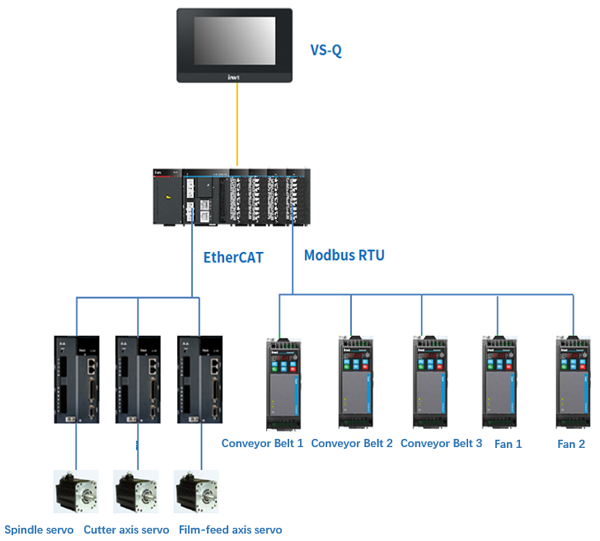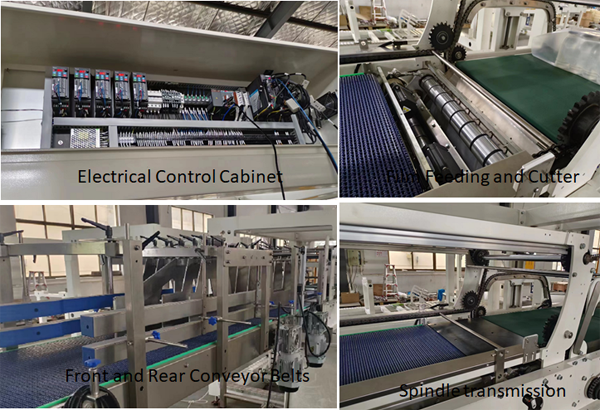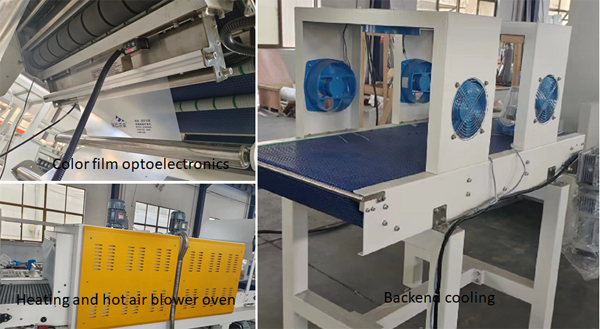With the rapid development of industries such as food and pharmaceuticals, the role of heat-shrink film packaging machines in automated production has become increasingly important. The primary function of a film packaging machine is to wrap shrink film around products or packaging items. Through heating, the shrink film contracts and tightly wraps the product or package, achieving purposes such as sealing, moisture-proofing, and preservation.
However, traditional heat-shrink film packaging machines have issues like low efficiency and limited precision, making it difficult to meet the demands of modern production. To address these issues, upgrading the electrical control technology is essential, providing a brand-new solution for heat-shrink film packaging machines.
INVT Solution
To meet manufacturers' production needs, INVT offers a system solution featuring the HIM+PLC+GD27 VFD+DA180 servo and motor. The display unit is a 10.2-inch touch screen, with the AX PLC as the core controller. Data exchange between the PLC and the touch screen occurs over LAN Ethernet. Key components include a main spindle servo, a film-feeding axis servo, and a cutter axis servo. The transmission section consists of three conveyor belts, with speed requirements for synchronous acceleration and deceleration. Additionally, two other VFDs control the hot air blowers. Together, these components form an automated, intelligent, and highly efficient packaging system. The control schemes for each section are as follows:
No. | Name | Control program |
1 | Front and rear transmission 1, 2 | PLC will convert the spindle production speed into frequency through RS485 communication to write into the VFD 1, 2, at the same time, there are VFD 1, 2 frequency setting times can be set on the touch screen. |
2 | Spindle | Spindle servo control motors drive the key part of the conveyor belt to run, the spindle part of the control of the operation, the other use of the virtual axis for angle processing |
3 | Film feed | The film feeding axis use cam and hangs on the spindle, there is acceleration and deceleration process when feeding the film, which is convenient for the picking rod to pick out the film to be fed. Bottle height, bottle diameter, and number of bottle rows are set on the touch screen to arrive at the final length of the film to be sent out. In addition, there is a single film feeding function in the manual mode, which simulates the process of film dispensing in the automatic mode. |
4 | Cut | The cutter axis travels on a cam and hangs on the film feed axis to ensure accurate cutting position. |
5 | Bottle detection | Based on the main spindle angle, set an appropriate angle on the HMI. If a bottle is detected within the inspection range, the entire machine stops operating. |
6 | Bottle pressing | Set an appropriate angle on the HMI based on the main spindle angle. Within a specified angle range, bottle pressing is paused, allowing the conveyor belt to move the bottle group into the main conveyor driven by the primary machine. At a certain angle, bottle pressing resumes, and bottle entry is halted. |
7 | Heat shrink | After film wrapping, products enter the oven section for heat shrink processing, completing the product packaging. |
8 | Cooling | After heat shrink wrapping in the oven, products move to the cooling fan section for temperature reduction and cooling. |

Customer Benefits
1 High Level of Automation: The heat-shrink packaging machine uses advanced automation technology, enabling full-process automation from material feeding, sealing, and heat-shrinking to finished product output. This boosts efficiency by over 30%, significantly shortens production cycles, and reduces labor costs.
2. Intelligent Control: The control system enhances precision by 20%, achieving accurate control over temperature, speed, and positioning. This ensures product quality and stability.
3. High Efficiency and Energy Savings: The efficient heat-shrink and cooling systems complete the heat-shrink process in a short time while reducing energy consumption, meeting energy-saving and environmental protection goals.
4. Strong Adaptability: The system is adaptable to various packaging sizes and product types, making it suitable for a wide range of applications.
On-site Photos


Summary
With ongoing technological advancements, the packaging industry is set to become increasingly intelligent, efficient, and eco-friendly. In the future, INVT will continue to introduce innovative automation products and system control solutions to achieve more precise control and manufacturing processes. Additionally, INVT will place greater emphasis on environmentally friendly and energy-saving technologies to reduce energy consumption and promote the rapid development of the packaging industry.



Our site uses cookies to provide you with a better onsite experience. By continuing to browse the site you are agreeing to our use of cookies in accordance with our Cookie Policy.